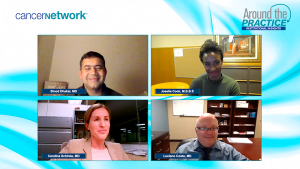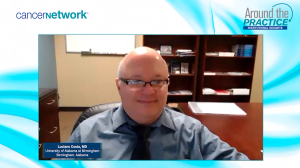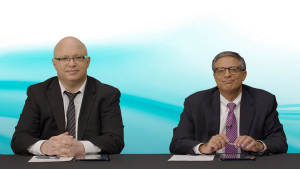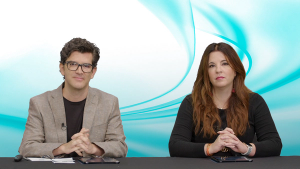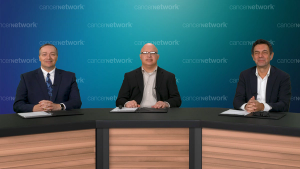Articles by Luciano Costa, MD, PhD
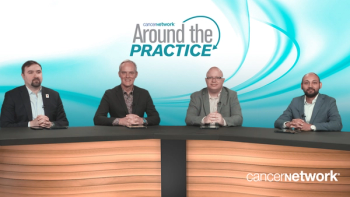
Looking Ahead: Major Clinical Advancements in Myeloma From ASH 2024 and What’s to Come in 2025
ByLuciano Costa, MD, PhD,Bhagirathbhai Dholaria, MD,Carl Ola Landgren, MD, PhD ,Muhamed Baljevic, MD, FACP Panelists discuss key strides made in 2024, including exciting data presented at the 66th American Society of Hematology Annual Meeting and Exposition (ASH 2024), and reflect on pivotal developments, such as new insights into Bruton tyrosine kinase inhibitors, that are shaping clinical practice while looking ahead to 2025 with anticipation for continued advancements that will further enhance treatment strategies and patient outcomes.

Integrating Bispecific Antibodies Into Clinical Practice
ByLuciano Costa, MD, PhD,Bhagirathbhai Dholaria, MD,Carl Ola Landgren, MD, PhD ,Muhamed Baljevic, MD, FACP Panelists discuss how bispecifics, like teclistamab, are administered at their institutions, the monitoring of cytokine release syndrome (CRS) and immune effector cell–associated neurotoxicity syndrome (ICANS) during step-up dosing, and strategies to improve care transitions between academic centers and community practices. They also highlight the potential for outpatient administration of bispecifics, as seen in the OPTec and Ambulatory Teclistamab studies, emphasizing the benefits of patient convenience and safety.

Sequencing Bispecifics and BCMA-Targeted Therapies in R/R MM
ByLuciano Costa, MD, PhD,Bhagirathbhai Dholaria, MD,Carl Ola Landgren, MD, PhD ,Muhamed Baljevic, MD, FACP Panelists discuss how bispecifics are sequenced with other B-cell maturation antigen (BCMA)–targeted therapies, such as chimeric antigen receptor (CAR) T cells or antibody drug conjugates (ADCs), and whether early vs late relapse impacts treatment strategies for relapsed/refractory multiple myeloma (R/R MM), with emphasis on how biological and clinical factors influence decision-making.

Strategic Use of Bispecific Antibodies in R/R MM
ByLuciano Costa, MD, PhD,Bhagirathbhai Dholaria, MD,Carl Ola Landgren, MD, PhD ,Muhamed Baljevic, MD, FACP Panelists discuss at what line of therapy bispecific antibodies are considered in treatment decision-making, whether they are used earlier or later in the sequence, and the factors influencing that choice, including weighing bispecifics against other options like chimeric antigen receptor (chimeric antigen receptor) T or standard therapies. They also address the clinical and molecular factors that guide the selection between B-cell maturation antigen (BCMA)– and GPRC5D-targeting bispecifics and comment on the study exploring talquetamab as a bridging strategy before BCMA CAR T therapy, highlighting the potential impact of bispecifics in this treatment paradigm.

Bispecifics in R/R MM: Key Data and Clinical Implications From ASH 2024 and Ongoing Trials
ByLuciano Costa, MD, PhD,Bhagirathbhai Dholaria, MD,Carl Ola Landgren, MD, PhD ,Muhamed Baljevic, MD, FACP Panelists discuss how bispecific antibodies are reshaping the therapeutic approach in relapsed/refractory multiple myeloma (R/R MM), covering their mechanism of action, currently approved agents, and potential advantages. They explore how these therapies have transformed clinical decision-making, including optimal lines of therapy, patient selection, and best practices for integrating bispecifics into clinical practice.

Transplant-Ineligible NDMM: Updates from CEPHEUS and IMROZ at ASH 2024
ByLuciano Costa, MD, PhD,Bhagirathbhai Dholaria, MD,Carl Ola Landgren, MD, PhD ,Muhamed Baljevic, MD, FACP Panelists discuss recent data updates on transplant-ineligible and deferred newly diagnosed multiple myeloma (NDMM), including findings from the CEPHEUS and IMROZ studies, and explore the clinical significance of minimal residual disease negativity as a prognostic and actionable factor in treatment decision-making for NDMM.

AURIGA Trial Highlights: Daratumumab + Lenalidomide Maintenance in Newly Diagnosed MM
ByLuciano Costa, MD, PhD,Bhagirathbhai Dholaria, MD,Carl Ola Landgren, MD, PhD ,Muhamed Baljevic, MD, FACP Panelists discuss evolving approaches to maintenance therapy in newly diagnosed multiple myeloma, focusing on balancing survival benefits with tolerability. They also review the latest data from the AURIGA trial evaluating daratumumab and lenalidomide maintenance.

Tailoring Induction Therapy in Newly Diagnosed Transplant-Eligible MM: Key Considerations
ByLuciano Costa, MD, PhD,Bhagirathbhai Dholaria, MD,Carl Ola Landgren, MD, PhD ,Muhamed Baljevic, MD, FACP Panelists discuss the factors influencing the choice between isatuximab and daratumumab for induction therapy in transplant-eligible newly diagnosed multiple myeloma, as well as the role of dara-based quadruplet regimens as the standard of care and considerations for triplet regimens in specific patient populations.

Highlights from ASH 2024: Optimizing Frontline Therapy in Transplant-Eligible MM
ByLuciano Costa, MD, PhD,Bhagirathbhai Dholaria, MD,Carl Ola Landgren, MD, PhD ,Muhamed Baljevic, MD, FACP Panelists discuss recent clinical trial findings, including the PERSEUS, CASSIOPEIA, IsKia, and GMMG-HD7 studies, and how these evolving treatment strategies are shaping the approach to frontline therapy for patients with transplant-eligible multiple myeloma.
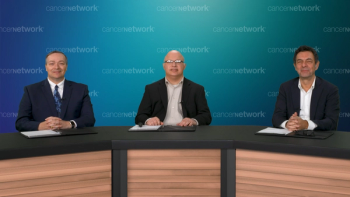
Experts dive into the complexities of defining and treating high-risk Multiple Myeloma (MM) and discuss the role of ASCT in newly diagnosed MM and weigh the considerations for recommending transplants, including insights on the selection criteria for tandem transplantations.

Philippe Moreau, MD, discusses recent data from the IFM 2018 trial which evaluated Dara-KRd induction and consolidation plus double transplants in high risk, TE NDMM.

Three medical oncologists explore the influence of MRD negativity rates on treatment decisions and discover the ideal patient profile for quadruplet regimen.

Larry Anderson, MD, goes over the recent data from the IsKia trial which investigated IsaKRd in pre-transplant induction and post-transplant consolidation in TE NDMM.

Three physicians explore the criteria for determining an adequate or successful response during the induction phase in patients with TE NDMM and uncover the intricate considerations shaping the choice of maintenance regimens.

Luciano Costa, MD, reviews recent data from the PERSEUS trial investigating the combination of daratumumab, bortezomib, lenalidomide and dexamethasone in newly diagnosed multiple myeloma patients.
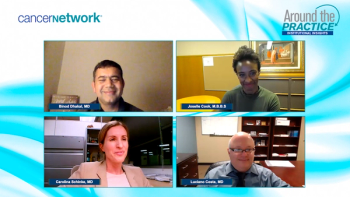
The panel closes by sharing final thoughts in the management of relapsed/refractory multiple myeloma, with a shared sense of optimism for advancements in treatment.

Key opinion leaders review the management of CAR-T therapy side effects in patients with relapsed/refractory multiple myeloma, including cytokine release syndrome and neurotoxicity, and emphasize the importance of early supervision and known toxicity timing.

Experts discuss the strategies and considerations for bridging therapy and the management of patients with relapsed/refractory multiple myeloma receiving CAR T-cell therapy.
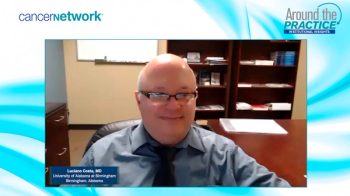
Luciano Costa, MD, discusses the effectiveness and challenges of CAR-T therapy ciltacabtagene autoleucel for patients with multiple myeloma, emphasizing the response rates and duration and the advantages in early lines of treatment.
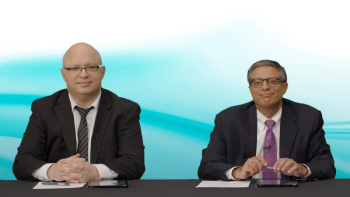
Advancements in Multiple Myeloma IO Therapy: Key Takeaways
BySagar Lonial, MD, FACP,Luciano Costa, MD, PhD,Cesar Rodriguez, MD,Donna Catamero, ANP-BC, OCN, CCRC Leading experts discuss the evolving landscape of myeloma immunotherapy, highlighting the potential of CAR-T and bispecifics and emphasizing the need for effective management of related toxicities to enhance patient outcomes.
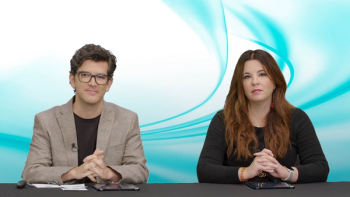
Navigating CAR-T Therapy in RRMM: Patient Counsel and Managing AEs
BySagar Lonial, MD, FACP,Luciano Costa, MD, PhD,Cesar Rodriguez, MD,Donna Catamero, ANP-BC, OCN, CCRC Explore the critical aspects of counseling patients on the expectations and management of cytokine release syndrome (CRS) and immune effector cell-associated neurotoxicity syndrome (ICANS) associated with CAR-T therapy.
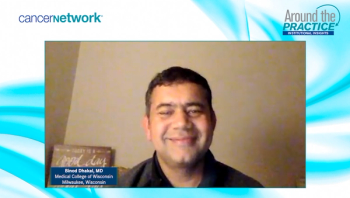
Dr Dhakal outlines the FDA-approved CAR T-cell therapy products for patients with multiple myeloma who have undergone at least four prior lines of treatment, emphasizing a focus on individualized decision-making when selecting patients for CAR-T.
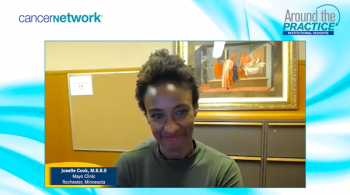
Joselle Cook, M.B.B.S., presents the case of a 62-year-old woman with high-risk multiple myeloma to the panel for discussion.
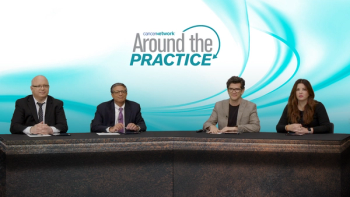
CAR-T vs BCMA Bispecifics: Navigating Myeloma Treatment Decisions
BySagar Lonial, MD, FACP,Luciano Costa, MD, PhD,Cesar Rodriguez, MD,Donna Catamero, ANP-BC, OCN, CCRC Expert panelists review the complex decision-making process between CAR-T and BCMA bispecific therapies in the management of relapsed myeloma, discussing patient-specific factors and relative risks and benefits.

Patient Scenario: Navigating Sequencing in Multiple Myeloma
BySagar Lonial, MD, FACP,Luciano Costa, MD, PhD,Cesar Rodriguez, MD,Donna Catamero, ANP-BC, OCN, CCRC A complex case study in multiple myeloma management, exploring treatment sequencing options for a patient with a long history of disease and multiple lines of therapy.

Joselle Cook, M.B.B.S., explains that she believes that elderly patients with relapsed/refractory multiple myeloma can still use bispecific therapies, though more objective data on frailty is needed.

Drs Costa, Dhakal, and Cook discuss managing the unique toxicities of bispecific antibodies in patients with relapsed/refractory multiple myeloma such as infections requiring prophylaxis and supportive care, and quality-of-life complaints like taste changes and skin issues.

Multiple Myeloma: Optimizing ICANS and CRS Management
BySagar Lonial, MD, FACP,Luciano Costa, MD, PhD,Cesar Rodriguez, MD,Donna Catamero, ANP-BC, OCN, CCRC Gain insight into strategies for monitoring for ICANS and CRS in myeloma treatment, including inpatient and outpatient administration, tocilizumab, dexamethasone, and impact on patient care.

Managing AEs in Multiple Myeloma: Dosing and Prophylactic Strategies
BySagar Lonial, MD, FACP,Luciano Costa, MD, PhD,Cesar Rodriguez, MD,Donna Catamero, ANP-BC, OCN, CCRC Key opinion leaders share their insight on managing adverse events in myeloma treatment, including dose adjustments and prophylactic strategies to improve outcomes and patient quality of life.

Joselle Cook, M.B.B.S., and Luciano Costa, MD, note promising trials investigating combination bispecific antibody therapies for patients with relapsed/refractory multiple myeloma.











